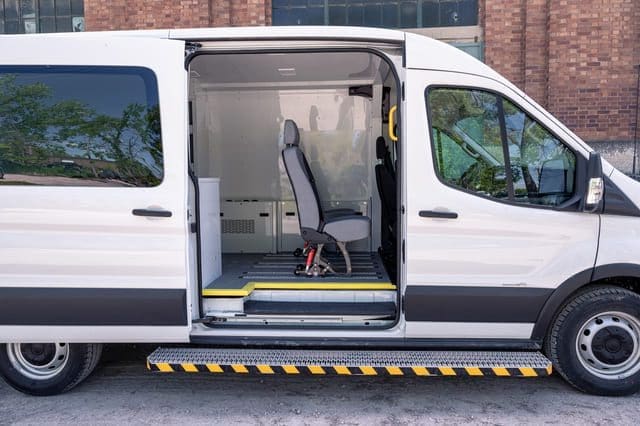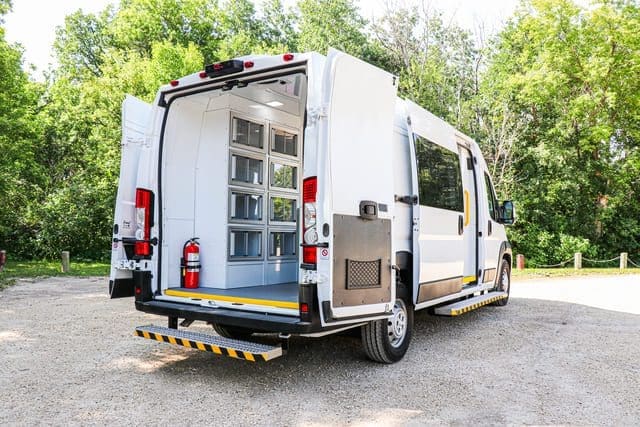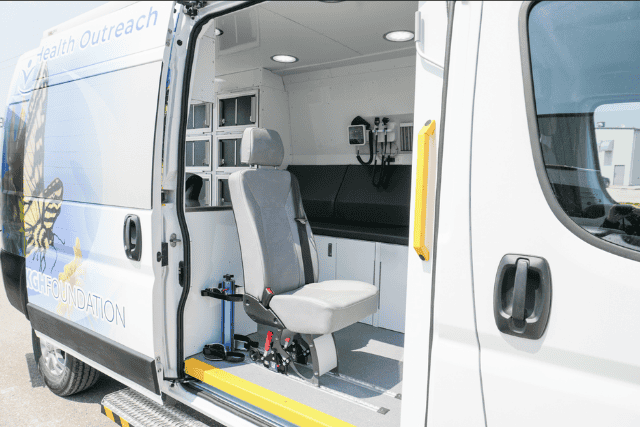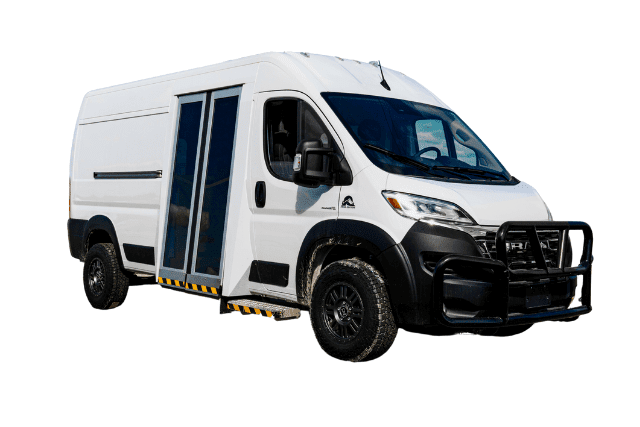Picture this: a frantic 911 call in the middle of the night, a person in crisis needing immediate help, but the only responders available are police officers who may not have the specialized training to handle mental health emergencies. Unfortunately, your county doesn’t currently have a mobile crisis response team (MCRT).
This is a reality many counties across the U.S. face daily. As a community leader or decision-maker, you are likely all too familiar with this challenge. The question of how to effectively address mental health crises and substance abuse in your county is pressing and complex. You want to ensure the safety and well-being of all residents, but current resources and solutions might feel inadequate.
We understand the weight of this responsibility. At AVAN Mobility, we’ve dedicated over 10 years to revolutionizing mobile medical vans that mobile crisis response teams can use as crisis response solutions. Our expertise in manufacturing specialized vehicles for healthcare and crisis situations positions us uniquely to offer innovative, practical, and effective options. We believe in transforming how communities respond to mental health crises by providing vehicles that make a real difference.
In this article, you’ll discover why having a mobile crisis response team is so important for your county. We will explore the benefits of an MCRT and provide actionable insights into setting up and optimizing a mobile crisis response team with the right solution.
By the end, you will better understand how MCRT teams can significantly improve your community’s safety and mental well-being.
Why are mobile crisis response teams so important?
- 1 in 5 adults in the U.S. experience a mental illness each year.
- 1 in 20 experience a severe mental illness every year.
- 1 in 6 youths between 6 and 17 experience a mental health disorder yearly.
- Suicide is the 2nd leading cause of death for people ages 10 to 14.
These numbers show that mental health crises are a big issue in our communities. These statistics probably concern you if you’re running an organization or county responsible for your county’s safety and well-being. You might feel a mix of worry and urgency, knowing that your community needs better resources to handle these crises.
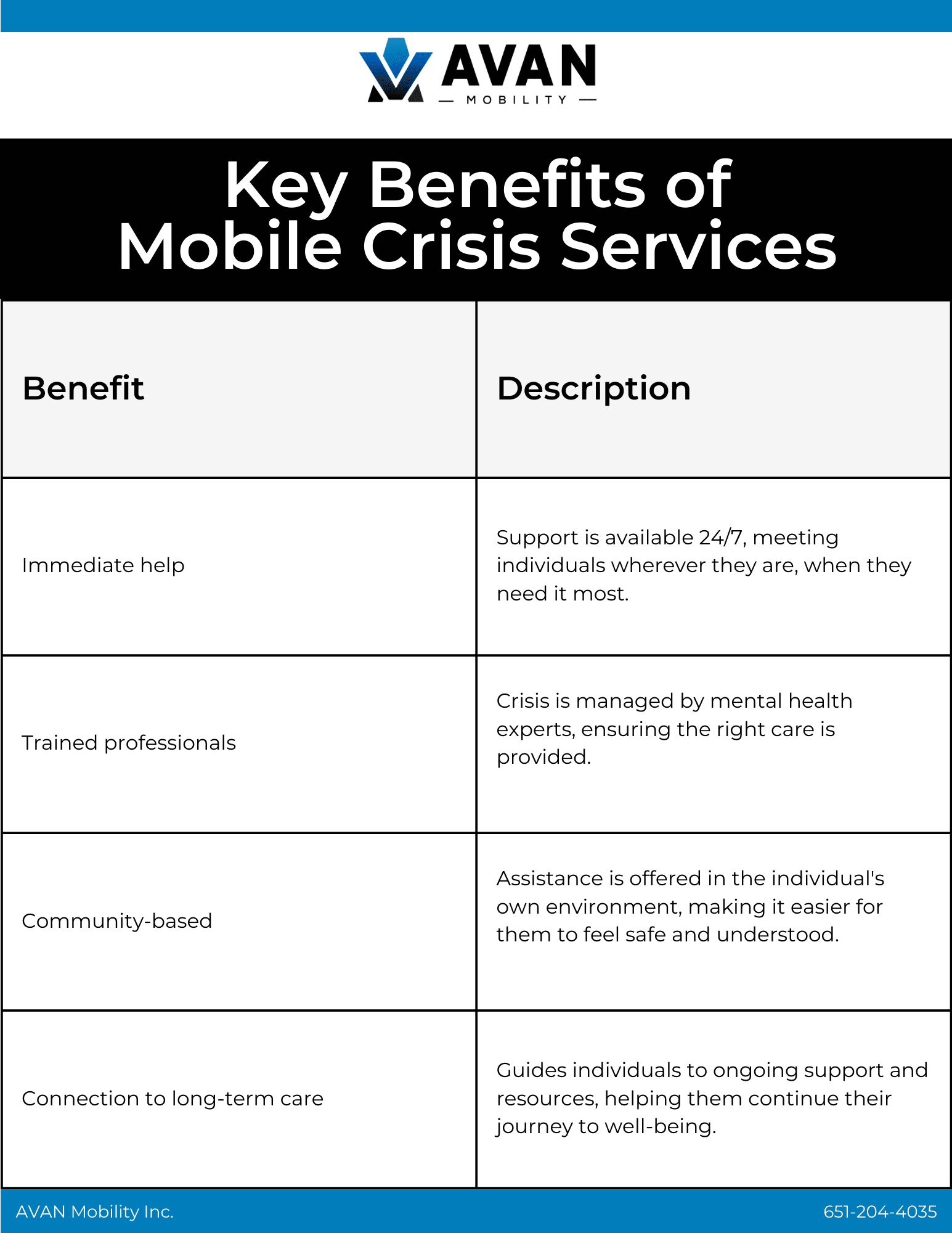
Mobile crisis teams provide immediate and specialized care
Mobile crisis response teams are vital because they provide quick, specialized help during mental health emergencies. Regular emergency responders, like police officers or paramedics, often lack the special training to handle these situations well. This can lead to misunderstandings and make the situation worse.
Mobile crisis response teams comprise mental health professionals who know how to deal with these emergencies correctly. This allows police to focus on their primary jobs.
Mobile crisis teams connect individuals to long-term resources
MCRTs do more than just handle the immediate crisis. They also connect people to long-term resources like counseling, support groups, and treatment programs. This means people get the ongoing help they need to manage their mental health or substance use disorders, which reduces the chance of future crises.
MCRTs are necessary for any county that wants to improve mental health crisis response and overall community well-being.
What are the benefits of mobile crisis services?
Let’s use California as an example to showcase the benefits of mobile crisis services. Many people in California have mental health or drug problems and often don’t get the right help. Instead of getting the treatment they need, they end up in emergency rooms or reaching out to the police. This ends up with them receiving the wrong type of help.
1 in 5 emergency rooms in California are full of people with mental health or drug problems.
Mobile crisis services help people wherever they are, 24 hours a day, seven days a week. This means people in crisis can get help quickly from trained professionals who know how to handle these situations. They don’t have to wait in a busy emergency room or deal with the police.
California’s Medi-Cal Service Benefit
California knows this is important, so they created a Medi-Cal service benefit so people can access mobile crisis services. This benefit makes sure people can get the right help when they need it most. It also reduces the pressure on emergency rooms and police.
With this benefit, Californians in crisis have a direct line to the help they need. They can get help at home, at work, or anywhere else. Medi-Cal helps to provide fast relief and connects people to long-term care. It makes sure they get the support they need to get better.
California’s mobile crisis services, offering community-based, 24/7 care, are changing how the state handles mental health and drug problems.
How can your county start providing mobile crisis response?
Your county can start providing mobile crisis response with the Mobile Outreach Van from AVAN Mobility. With this van, you can offer services like:
- Mental health and addictions counseling
- Harm reduction
- Overdose prevention
- Referral services
- Mobile health
Think of the Mobile Outreach Van as a transportation option and a clinic space all-in-one.
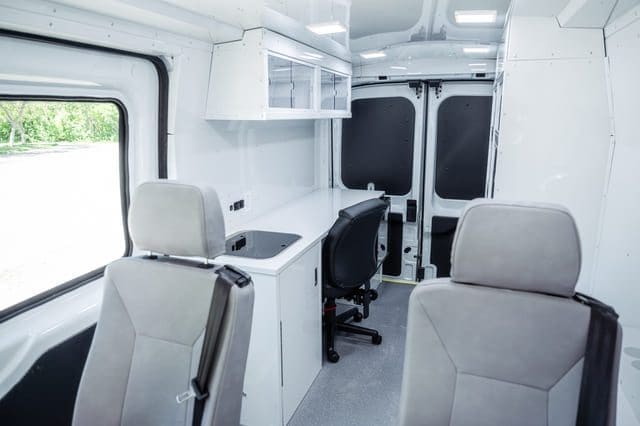
What are some features of the Mobile Outreach Van?
The Mobile Outreach Van has many useful features that are perfect for providing support to individuals in crisis.
| Feature | Benefit |
| Clean and comfortable environment | Helps clients feel safe and calm during their crisis. |
| Rear heat & air conditioning | Your patients will be more comfortable in any type of weather. |
| Removable passenger seats | Gives you the flexibility to transport more people or set up equipment, meeting everyone’s needs. |
| Overhead storage | Keeps supplies organized and within easy reach, so you can focus on helping your clients. |
| Sink and fridge | Lets you perform basic medical procedures and store perishable supplies, providing better care on the go. |
| Mobile office desk space | Allows you to complete paperwork and coordinate care from the van, keeping everything running smoothly. |
| Floor-to-ceiling storage cabinets | Offers plenty of space to store medical supplies and counseling materials, so you’re always prepared to support your clients. |
| Cab divider for privacy (optional) | Provides private spaces for conversations and therapy sessions, making your clients feel more comfortable and secure. |
| Winter tires (optional) | Lets you operate safely in all weather conditions, so your clients receive care no matter the season. |
| Grab handles (optional) | Improves safety for your clients when getting in and out of the van, making their experience more secure. |
| Advanced medical equipment (optional) | Equips the van with the tools needed to handle crises, helping you provide the best care possible. |
Example of a mobile crisis team in action with the Mobile Outreach Van
Jane, a 17-year-old girl, feels utterly hopeless and calls a crisis hotline, fearing she can’t go on. The mobile crisis team arrives quickly in the Mobile Outreach Van. They find Jane sitting alone in her backyard, tears streaming down her face.
Gently, they invite her into the van, where the clean and comfortable environment helps her feel a bit safer. The rear heat keeps the space warm and cozy on this cold night. Jane sits on one of the removable passenger seats while a kind counselor sits nearby, ready to listen.
The team uses the mobile office desk space to jot down Jane’s story and contact local mental health resources. The overhead storage has a blanket that’s ready to keep Jane comfortable and warm. After a heartfelt conversation in the private cab area, Jane begins to feel a glimmer of hope.
The counselor reassures her, and together, they create a safety plan. They offer her a water bottle from the fridge, ensuring she feels cared for and not alone. Jane agrees to see a local therapist, feeling supported and understood.
With the van’s help and the team’s compassion, Jane takes her first steps toward recovery, knowing she has people who care about her and her well-being.
Empower your community with a mobile crisis response team
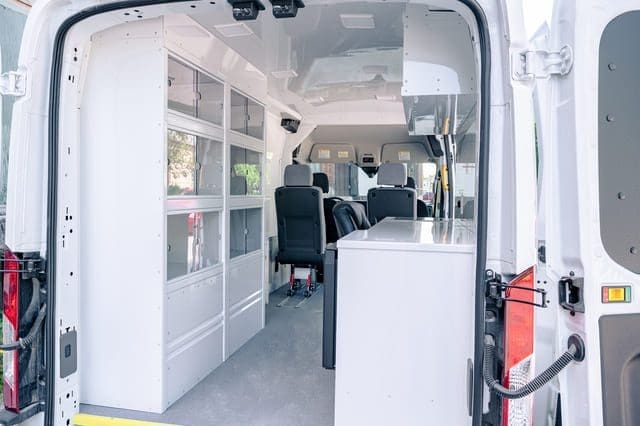
You came to this article to understand why a mobile crisis response team is important for your county. You’ve learned how these teams can provide quick, specialized help and how our Mobile Outreach Van can make a real difference.
At AVAN Mobility, our decade of experience has helped us design the Mobile Outreach Van, which is designed to meet the needs of communities, offering a safe, comfortable, and fully equipped space for crisis care. We take pride in helping counties like yours provide effective and caring help to those in need.
We know the challenges you face, and we are here to support you. As leaders in the industry, we are committed to making your community safer and healthier. If you have any questions, click the button below to talk to Russ or Simon, our commercial mobility experts at AVAN Mobility.
If you’re not quite ready to speak to someone yet, we have some other articles you might like to read. Start with our article on the top 5 areas to deploy a Mobile Outreach Van in the U.S. This might help you decide where you want to start a mobile crisis response team.
You should also read through our article on the Mobile Overdose Prevention Van. This article is perfect if your mobile crisis response team is more geared toward helping people with substance abuse disorders.
